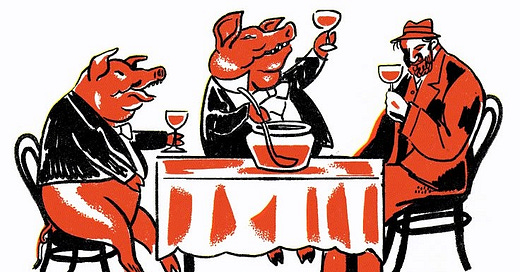Yesterday, I picked up Animal Farm by George Orwell and read it in one sitting.
I’ve read 1984 before—it left me feeling like a lunatic, walking around for days seeing signs and signals everywhere, feeling like the world we live in was built off those pages. So when I came across that one chilling sentence in Animal Farm—
“All animals are equal, but some are more equal than others.”
—I instantly understood what it meant.
But when I read it aloud to my grandma, she didn’t get the metaphor. That moment stuck with me. It made me realize how much of this kind of insight—about power, manipulation, injustice—is intuitive for some, and invisible to others. And maybe that’s one of the reasons the world stays unequal.
So what does this paradoxical statement really mean, and why does it still resonate so deeply?
The Illusion of Equality
In the early stages of Animal Farm, the animals rise up in rebellion, fueled by a dream: a society where all are equal. No more masters, no more exploitation. Just fairness, cooperation, shared labor.
But then the pigs take control. And slowly, they begin to carve out privileges for themselves. More food. More comfort. More power. The rest of the animals keep working—tired, confused, and loyal. By the end, the pigs walk upright and drink with humans. The revolution devours itself.
The phrase “some are more equal than others” appears when the pigs rewrite the farm’s commandments. It’s a linguistic trick that flips logic on its head—a weapon of control wrapped in the language of fairness.
Modern Echoes of Orwell’s Warning
Orwell wrote this in 1945. But read the news—any day, anywhere—and it’s clear: the animals are still on the farm.
We preach equality. In law. In politics. In work. In opportunity. But in practice? It’s often a well-dressed illusion.
You think I’m exaggerating?
Let’s Talk About Reality
Corporate Equality—When It’s Convenient: In 2025, companies like Target and PepsiCo scaled back their diversity commitments, sparking backlash and meetings with civil rights leaders. Their public stance on fairness didn’t hold up when real change became inconvenient.
Influence for Sale: Australian politicians accepted thousands in perks from sports leagues while debating related legislation. Meanwhile, U.S. lobbying hit $4.5 billion in 2024. These examples show how wealth can amplify certain voices in policymaking—making some “more equal.”
Climate Inequality: Poorer nations suffer the worst climate impacts despite contributing the least to the crisis. Wealthier countries, better protected and historically more responsible, often dominate the conversation. Justice, it seems, depends on geography and GDP.
Language as a Tool of Power
Orwell understood something crucial: language isn’t just how we talk about the world. It’s how we build it.
“More equal” is nonsense—but repeat it enough, and people stop questioning. Today, we hear echoes of this all the time:
“We’re all in this together.” (Unless some of us have yachts.)
“Everyone has the same opportunities.” (But some are born in the back row.)
“Justice is blind.” (Until it checks your income bracket.)
These aren’t just lies—they’re tranquilizers. They make inequality feel like a glitch in the system instead of the system itself.
So, What Can Be Done?
Is awareness, accountability, and empathy enough?
Maybe.
But what if a revolution is needed?
What happens after the revolution?
What happens if we become the pigs?
“The creatures outside looked from pig to man, and from man to pig, and from pig to man again; but already it was impossible to say which was which.”
With love,
Núria.





